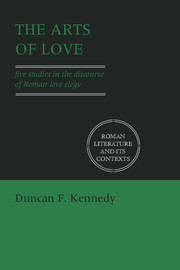2 - Getting down to essentials
Published online by Cambridge University Press: 05 June 2012
Summary
From the perspectives offered by modern criticism, the elegies of Tibullus, Propertius and Ovid are ‘about’ a wide variety of issues – politics, patronage, their own status vis-à-vis other genres, for example – but they seek their ultimate definition as the poetry of amor. Ovid's first collection of elegies is called Amores, a title which recalls that apparently given to his four books of elegies by Cornelius Gallus, thus giving rise from the very beginning to the assumption that their subject will be amor; and on virtually any account amor is indeed central to elegiac discourse. But what does it mean? Such a question seeks its answer in an essentializing definition. The assumption that the word primarily or exclusively stands for or refers to the experience of an emotion informs most standard treatments of elegy: these poems are ultimately ‘about’ the love of Propertius for Cynthia or Ovid for Corinna. But if amor can signify an emotion, it can also, as we've already seen, signify the title of a book. In poem 1.7 of Propertius, which is addressed to a person called Ponticus who is described as an epic poet writing a work that will rival those of Homer, the speaker says of himself in contrast (5), nos, ut consuemus, nostros agitamus amores: I, as I have been accustomed to do, get on with my – amores.
- Type
- Chapter
- Information
- The Arts of LoveFive Studies in the Discourse of Roman Love Elegy, pp. 24 - 45Publisher: Cambridge University PressPrint publication year: 1992



